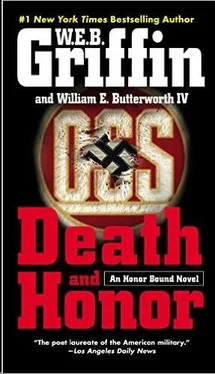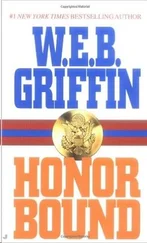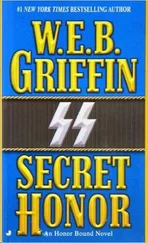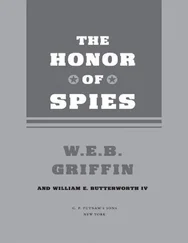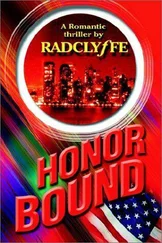Griffin W.E.B. - Honor Bound 04 - Death and Honor
Здесь есть возможность читать онлайн «Griffin W.E.B. - Honor Bound 04 - Death and Honor» весь текст электронной книги совершенно бесплатно (целиком полную версию без сокращений). В некоторых случаях можно слушать аудио, скачать через торрент в формате fb2 и присутствует краткое содержание. Год выпуска: 2009, Издательство: Penguin USA, Inc., Жанр: Старинная литература, на английском языке. Описание произведения, (предисловие) а так же отзывы посетителей доступны на портале библиотеки ЛибКат.
- Название:Honor Bound 04 - Death and Honor
- Автор:
- Издательство:Penguin USA, Inc.
- Жанр:
- Год:2009
- ISBN:нет данных
- Рейтинг книги:4 / 5. Голосов: 1
-
Избранное:Добавить в избранное
- Отзывы:
-
Ваша оценка:
- 80
- 1
- 2
- 3
- 4
- 5
Honor Bound 04 - Death and Honor: краткое содержание, описание и аннотация
Предлагаем к чтению аннотацию, описание, краткое содержание или предисловие (зависит от того, что написал сам автор книги «Honor Bound 04 - Death and Honor»). Если вы не нашли необходимую информацию о книге — напишите в комментариях, мы постараемся отыскать её.
Honor Bound 04 - Death and Honor — читать онлайн бесплатно полную книгу (весь текст) целиком
Ниже представлен текст книги, разбитый по страницам. Система сохранения места последней прочитанной страницы, позволяет с удобством читать онлайн бесплатно книгу «Honor Bound 04 - Death and Honor», без необходимости каждый раз заново искать на чём Вы остановились. Поставьте закладку, и сможете в любой момент перейти на страницу, на которой закончили чтение.
Интервал:
Закладка:
“You’re pulling my leg,” Graham said.
“I told the commander in chief that you would implement his suggestion, Colonel Graham.”
“No way, Bill. It’s a . . . nutty . . . idea.”
“After I tell you that FDR really warmed to his idea—he feels that not only would it enhance the image of the arsenal of democracy—”
“Meaning what?”
“That the arsenal of democracy, now in high gear, is so formidable that we can sell the very latest airplanes to friendly—or neutral—foreigners.”
Graham grunted.
“And, waving his cigarette holder around, the President smugly suggested that the OSS could probably find some advantage in having its own airline.”
Graham sadly shook his head.
“You want to tell him it’s a nutty idea, Alex?” Donovan asked.
“If I thought it would do any good, I’d be happy to tell him,” Graham said. “But since Roosevelt believes he is divinely inspired—”
“Between us—to go no further than this room—what’s wrong with the idea?”
“Off the top of my head, I can think of a number of things wrong with it. For one thing, even if Frade could get permission to set up an airline, which seems unlikely, he’s not qualified to run an airline. For God’s sake, he really shouldn’t even be flying the Lodestar he has.”
"Why not?”
“Because he’s likely to kill himself doing so. And we need him alive, not spread over some mountain in the Andes.”
“I somehow got the idea he’s a pretty good pilot,” Donovan said. “He’s an ace, right? And he has been flying the Lodestar he has?”
“He’s a Marine fighter pilot, a young one. He therefore believes he can fly anything. That is known as the arrogance of youth.”
“The President is very impressed with him.”
“Did the President suggest where the pilots to fly the airplanes of OSS Airways are supposed to come from?”
“Argentina.”
“And who’s going to train them? Frade?”
“Would you believe me if I told you I tried—hard—to dissuade FDR from this airline idea? And raised the question of pilots to him?”
“And what did he do? Flash that famous smile and say, ‘Oh, Bill, that can be worked out’?”
“What he said was that Arnold also told him that the pilot-training program has gone so well that they are getting ready to release the transport pilots commissioned early on to return to the airlines, and that they would be ideal, because of their experience, in setting up an airline.”
“You mean transfer them to the OSS?”
“He didn’t get into that. But that could be worked out.”
Graham snorted.
“Will have to be worked out,” Donovan added. “The bottom line, Alex, is that unless you can talk him out of this idea . . .”
“Huh!”
“. . . there will be an airline.”
Graham shook his head again but said nothing.
“Among the many reasons I like you, Alex,” Donovan said, after a moment, “and the primary reason I put up with your—how do I phrase this? — independent spirit is that I know if I give you an order, you’ll either obey it or tell me, up front, that you won’t take the order. You are not capable of accepting an order and then not doing your very best to carry it out.”
“I gather this is an order?”
Donovan nodded.
“Keep what you just said in mind, Bill, if I can’t make your airline idea . . .”
“The President’s airline suggestion.”
“. . . fly.”
Donovan smiled, then had another thought.
“Just a second, Alex,” he said, and reached for the accordion envelope and handed it to Graham.
“Why don’t you stop by the Documents Branch and have these made out for Major Frade and his team before you go?”
Graham examined the credentials, at first curiously and then incredulously.
“And whose idiot idea was this?”
“If you mean, Was this another presidential suggestion? No. It came from downstairs.”
Graham, shaking his head in disbelief, handed the envelope back to Donovan.
“No, I meant it,” Donovan said. “Take the badges down there.”
“I’m not following you, Bill.”
“What the hell, everybody down there in South America—friend, foe, and ostensibly neutral—knows Frade’s in the OSS, so why not? And—I admit this is unlikely—it might just remind him he’s in the OSS if you handed him a fancy badge like that.”
Graham looked at Donovan for a moment, then said, “Well, I can’t see where it would do any harm.”
“Have a nice flight, Alex. Keep in touch.”
[FOUR]
El Palomar Air Field Campo de Mayo Military Base Buenos Aires Province, Argentina 1525 4 July 1943
As the airliner taxied up to the terminal, Colonel A. F. Graham saw—not surprising him at all—that El Coronel Alejandro Bernardo Martín had elected to meet Varig Flight 207.
Martín, wearing a well-cut suit and an overcoat, was standing outside the terminal building with a group of immigration and customs officers. He was a tall, fair-haired, light-skinned thirty-six-year-old who carried the euphemistic title of “Chief, Ethical Standards Office” within the Ejército Argentino’s Bureau of Internal Security. In fact, he was the most powerful—and, making him even more dangerous, the most competent—intelligence officer in Argentina.
It had been necessary for Graham to get a visa for travel to Argentina. Said visa had been stamped at the Argentine embassy in Washington inside a diplomatic passport issued with the greatest reluctance by the State Department. The passport identified Graham as a career State Department officer with the personal rank of under secretary. The Department of State, in requesting Graham’s visa from the Argentine embassy, had declared he was traveling to Argentina to coordinate security and other matters at the U.S. embassy.
No one was fooled. But both the Argentines and the Americans understood the rules of the game. Graham would have diplomatic status in Argentina, protecting him from arrest. Theoretically, if he was caught with twenty pounds of dynamite in the act of placing it under the Casa Rosada—Argentina’s pink equivalent of the White House—all that could happen to him would be to be declared persona non grata and expelled from the country, after which the Argentine ambassador in Washington would “make representations” to the U.S. secretary of State.
As a practical matter, both sides understood that if he were caught trying to blow up Casa Rosada—or in some other outrageous activity—he would be shot, after which the American ambassador in Buenos Aires could “make representations” to the Argentine foreign minister.
There were Argentines in Washington carrying diplomatic passports—most of them running errands for the Germans—with no more right to theirs than Graham had to his. They were under constant surveillance by the FBI, as Graham would be under constant surveillance by the BIS in Argentina.
But as diplomats they were protected against arrest and could not be questioned, which obviated the necessity of coming up with some imaginative excuse to explain one’s presence where one was not supposed to be.
Anything less than really outrageous behavior was tolerated by both the United States and Argentina. It was in their mutual interest.
And there was a simple, logical explanation as to why Graham found El Coronel Martín meeting his Brazilian airline flight not surprising. There was no question in Graham’s mind that within an hour of his acquiring the visa— no longer than it had taken to encrypt the message—somebody from the Argentine embassy had gone to Western Union, or Mackay Radio, and sent a cable informing the BIS that Graham was coming to Buenos Aires.
Читать дальшеИнтервал:
Закладка:
Похожие книги на «Honor Bound 04 - Death and Honor»
Представляем Вашему вниманию похожие книги на «Honor Bound 04 - Death and Honor» списком для выбора. Мы отобрали схожую по названию и смыслу литературу в надежде предоставить читателям больше вариантов отыскать новые, интересные, ещё непрочитанные произведения.
Обсуждение, отзывы о книге «Honor Bound 04 - Death and Honor» и просто собственные мнения читателей. Оставьте ваши комментарии, напишите, что Вы думаете о произведении, его смысле или главных героях. Укажите что конкретно понравилось, а что нет, и почему Вы так считаете.
